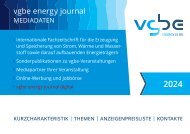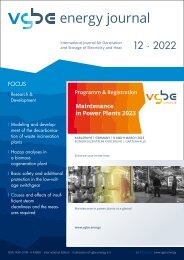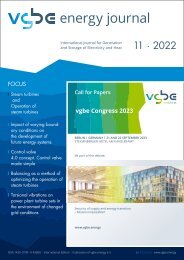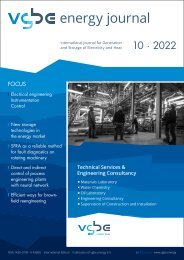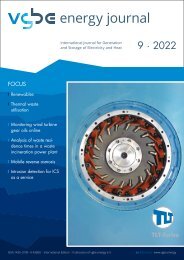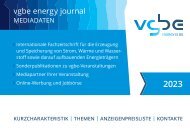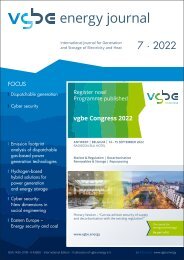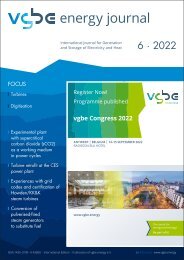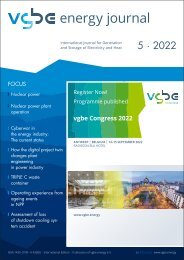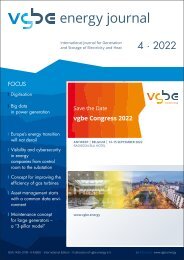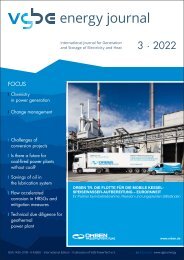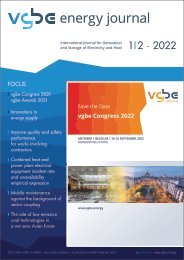VGB POWERTECH 11 (2019)
VGB PowerTech - International Journal for Generation and Storage of Electricity and Heat. Issue 11 (2019). Technical Journal of the VGB PowerTech Association. Energy is us! Power plant operation: legal & technology. Pumped hydro storage. Latent heat storages.
VGB PowerTech - International Journal for Generation and Storage of Electricity and Heat. Issue 11 (2019).
Technical Journal of the VGB PowerTech Association. Energy is us!
Power plant operation: legal & technology. Pumped hydro storage. Latent heat storages.
You also want an ePaper? Increase the reach of your titles
YUMPU automatically turns print PDFs into web optimized ePapers that Google loves.
A journey through 100 years <strong>VGB</strong> | <strong>VGB</strong> <strong>POWERTECH</strong> 4 (2006)<br />
R&D in EURELECTRIC´s View<br />
EURELECTRIC´s View on R&D Needs<br />
Kurzfassung<br />
F&E-Erfordernisse aus Sicht<br />
von EURELECTRIC<br />
Im Zuge der stark zunehmenden Liberalisierung<br />
sowie immer strikter werdender umweltrechtlicher<br />
Vorgaben hat die der EURELEC-<br />
TRIC zugehörige Arbeitsgruppe Forschung<br />
und Entwicklung ihren Arbeitsschwerpunkt auf<br />
eine Ermittlung der tatsächlichen Bedürfnisse<br />
von Forschung und Entwicklung gelegt, um<br />
den neuen Anforderungen der kommenden<br />
Jahrzehnte adäquat gewachsen zu sein.<br />
Die sich verändernden Rahmenbedingungen<br />
des Geschäftsbereichs führen offensichtlich zu<br />
den zwei gegensätzlichen Zielsetzungen Rentabilität<br />
(Erhöhung der Wettbewerbsfähigkeit)<br />
und Verantwortung (der Elektrizitätssektor im<br />
Rahmen einer dauerhaft zuverlässigen, nachhaltigen<br />
Entwicklung). Maßgebliche Aufgabe<br />
von Forschung und Entwicklung ist es heute,<br />
dieses Problemfeld sinnvoll auszufüllen.<br />
Daher erfolgte unter anderem die intensive<br />
Kontaktaufnahme mit der Europäischen Kommission,<br />
um die europäischen Sichtweisen<br />
von Forschung und Entwicklung mit denen der<br />
EURELECTRIC in Einklang zu bringen. Dies<br />
gilt besonders im Hinblick darauf, dass die Europäische<br />
Kommission gerade das siebte Rahmenprogramm<br />
für Forschung und Entwicklung,<br />
das FP7, in die Wege leitet.<br />
Im ersten Teil dieses Beitrags wird die aktuelle,<br />
auf Grundlage einer im Jahr 2004 von der<br />
EURELECTRIC durchgeführten Umfrage, Situation<br />
geschildert. Im zweiten Teil wird auf die<br />
zukünftigen Bedürfnisse von Forschung und<br />
Entwicklung eingegangen und dabei werden<br />
besonders die Bereiche für eine mögliche Zusammenarbeit<br />
in den Vordergrund gestellt. Die<br />
aktuelle Situation kennzeichnet sich hauptsächlich<br />
durch:<br />
— Verknappung der Budgets für Forschung<br />
und Entwicklung sowie die Unbeständigkeit<br />
in der Finanzierung durch Staat oder<br />
öffentliche Hand,<br />
— Schwerpunktsetzung auf kurzfristige, gewinnorientierte<br />
Themenbereiche,<br />
— Entwicklung energiebezogener Produkte<br />
und Dienstleistungen zur Wertzuwachssteigerung<br />
beim Endkunden.<br />
Die Bedürfnisse von Forschung und Entwikklung<br />
für die Zukunft werden detailliert dargestellt.<br />
Dabei wird auf zwei an die Europäische<br />
Kommission überstellte Positionspapiere Bezug<br />
genommen.<br />
Es wird der Schluss gezogen, dass Forschung<br />
und Entwicklung im Elektrizitätssektor für diese<br />
Zeit der umfangreichen und grundlegenden<br />
Änderungen von entscheidender Bedeutung<br />
sind.<br />
Introduction<br />
In the rapidly evolving context of liberalisation<br />
and more stringent environmental regulations,<br />
the WG R&D of EURELECTRIC<br />
has concentrated its efforts on evaluating<br />
R&D needs and its organisation in order to<br />
meet the new challenges coming in the next<br />
decades. Intensive contacts have been taken<br />
with the European Commission (EC) in order<br />
to align the European and the EURELEC-<br />
TRIC views on R&D, especially in light of<br />
the fact that the EC is now in the process of<br />
launching the Seventh Framework Program<br />
for R&D (FP7), which will govern all R&D<br />
subsidies and actions for the next eight years.<br />
Context<br />
Back to the basics, the mission of the electricity<br />
industry as defined in the green paper<br />
of the EU [1] is the following:<br />
“To ensure the uninterrupted physical availability<br />
of energy products on the market, at a<br />
price which is affordable for all consumers<br />
(private and industrial) while respecting environmental<br />
concerns and looking towards<br />
sustainable development.”<br />
The full achievement of this mission is particularly<br />
difficult. Indeed, the supplying of<br />
electricity is a highly conservative business<br />
with slow technological evolution, yet which<br />
is faced with rapid background changes.<br />
These hardly compatible features are explicated<br />
as follows:<br />
— Slow technological evolution of the electricity<br />
industry<br />
– heavy assets with long life,<br />
– mostly mature technologies,<br />
– long installation periods/high investments<br />
for new assets.<br />
– Changing background<br />
– regulatory changes,<br />
– competitive environment,<br />
– new market entrants<br />
– new business model,<br />
– increasing customer focus,<br />
– pan-European integration,<br />
– global environmental issues.<br />
Moreover, social pressure is becoming<br />
stronger; not only against nuclear energy, but<br />
also against new installations, even against<br />
some renewables (e.g. offshore wind turbines).<br />
On the other hand, security of supply<br />
is considered as a normal rule: the tolerance<br />
for blackout is tending to zero.<br />
The changing background obviously leads to<br />
the two contradictory objectives of profitability<br />
(improve competitiveness) and responsibility<br />
(the electricity industry as an instrument<br />
to reach sustainable development).<br />
Thus, R&D must be focused on resolving<br />
that dilemma (Figure 1).<br />
Profitability is a business issue:<br />
Corresponding R&D is aimed at improving<br />
competitiveness by<br />
Autoor Author<br />
Jacqueline Stubbe<br />
Executive Manager<br />
Strategy, Business Development<br />
and Control,<br />
LABORELEC, Linkebeek/Belgium.<br />
Figure 1. R&D has to resolve contradictory objectives.<br />
30 <strong>VGB</strong> PowerTech 4/2006<br />
74




